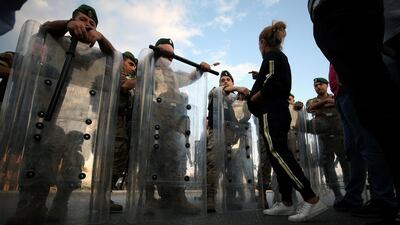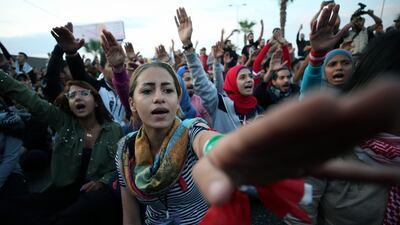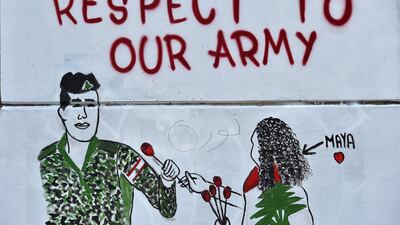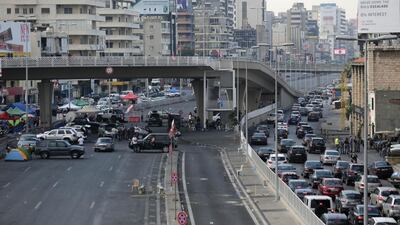The Lebanese government wanted Monday to be the day the country went back to work after 11 days of mass protests that have paralysed the nation.
But those on the streets resoundingly rejected the call by politicians to open the blocked roads and allow schools and universities to resume classes.
By late Sunday evening, residents around Jal El Deeb, north of Beirut, had turned the main northern motorway into a car park, abandoning thousands of vehicles but leaving the centre lane open for emergencies.
The next afternoon, close to 100 cars were still there, although the number of protesters was sparse because of rain.
In the centre of Beirut, protesters blocked the ring road connecting east and west Beirut in both directions, except to the army and ambulances.
“I didn’t really believe him but, oh well,” said a protester who had just let through a driver, who claimed he desperately needed medicine.
Throughout the weekend the police and army opened the road before protesters cut it again.
On Sunday night, the sit-in on the motorway took on an air of permanence, with mattresses, couches and carpets, and a fridge.
Before long the House of the People, as it was called, was listed on Airbnb. The listing said the house had 50 beds and cost nothing each night to stay.
Protesters camped through the night and as Sunday broke about 100 people remained. Speakers were erected and people danced, sat and chatted, and chanted against the government.
Some started grilling chicken on a barbecue, prompting a passer-by to jokingly ask: “Who is funding this?”
The question was a reference to Hezbollah leader Hassan Nasrallah’s insinuation that the protests were funded by foreign countries to destroy his Iran-backed militia.
“It’s plausible that someone is trying to bribe protesters but you cannot bribe two million Lebanese, that’s a bit ridiculous,” one of them laughed in response.
There are no official figures but observers estimate that as many as 2 million people took to the streets at the height of the protests.
The protesters are demanding the resignation of the government, solutions to rampant corruption and a way to avert the financial collapse of the country without imposing more taxes and levies.
They are angry at years of ineffectual governance, widespread corruption and lack of basic services.
The government is yet to make any suggestion that appeases the people despite a package of proposed reforms put forward by Prime Minister Saad Hariri last Monday.
Security heads met over the weekend to discuss a plan to reopen motorways but the army did not appear to be clearing protesters on Monday morning.
“The numbers are growing and will continue until a change occurs in the government, until the government decides to resign, or the president [Michel Aoun] decides to resign,” said Diana Tass, 23, a recent graduate in French literature who was camped on the ring road with two friends.
"We will not stop blocking the roads. We’re closing the road so that people cannot go to work. We’re not closing the road because we want to make life harder.”
Ms Tass said the protest was evolving spontaneously. People passing by would offer to bring supplies, buy food or even repair the bench on which she sat.
An elderly woman sitting on a sofa became emotional when a dozen young people sang to her: “For your eyes, granny, we’re going to change the country from its foundation."
She later blew them kisses as she was driven away.
In his first address to protesters, Mr Aoun on Thursday offered to meet representatives to negotiate on their demands. But the offer was not taken up because the protest movement has no leadership.
Ms Tass said protesters were not interested in more talk after years of hollow promises.
"We don’t think how many days," she said. "It could be weeks, it could be days.
"Some people still believe we can have a discussion with the government but not really, all of their promises are empty.
"Some of them say, ‘We should give them a chance’, but we did already and we don’t think they will change anything so we’re going to stay here until they resign."
Ms Tass said they would wait until a new government was formed that was accepted by the people.
“Otherwise they will choose their own people," she said. "Once we are out of the streets it’s the end, so we have to stay here.”
The protests have been largely peaceful although the army used force at the start of the uprising and has clashed intermittently with protesters when trying to reopen roads.
In Jal El Deeb, Elie Fares proudly showed the nine stitches on his scalp caused by scuffles with soldiers last week.
“We are sure the revolution will succeed because we represent good and the government represents bad,” said Mr Fares, a diamond dealer and member of Lebanese Forces party.
The party, which has strong support in the area, resigned from government at the start of the protests.
No violence was reported on Monday, despite unidentified gunmen opening fire at protesters in the Bekaa region, on the Syrian border.
No one was injured, the state-run National News Agency reported.
Central bank governor Riad Salameh warned on CNN that Lebanon was “days away” from an economic collapse, before backtracking.
"We need to have a solution in a matter of days to regain confidence and avoid collapse in the future," Mr Salameh told Reuters.
Banks across the country will close again on Tuesday, after shutting on the first day of the uprisings.
On Monday, protesters gathered in front of the central bank offices in Beirut and Nabatieh, accusing the regulator of responsibility for Lebanon’s financial collapse.
Experts and analysts are warning that the uncertainty caused by nearly two weeks of demonstrations could cause a run on the banks, who will then suffer a liquidity crisis.
The Association of Banks in Lebanon has said it will reopen only when things return to normal, although ATMs remain stocked with cash in most areas.
The International Monetary Fund said on Monday that Lebanon should implement reforms quickly to restore confidence and economic stability.
Mr Aoun on Monday met university leaders, who have broadly backed the demands of protesters, to discuss the demonstrations.









